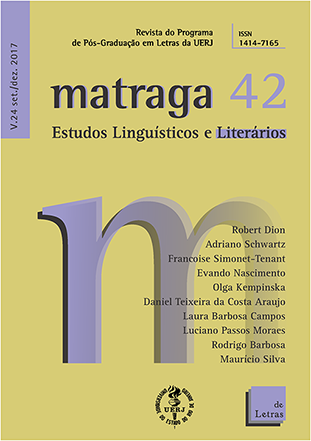Traduzir-se. Diários de Gombrowicz
DOI:
https://doi.org/10.12957/matraga.2017.29562Palavras-chave:
Forma. Diário. Witold Gombrowicz. Joseph Conrad.Resumo
Partindo da perspectiva da elaboração do diário como um laboratório de subjetividade, o artigo examina as ambivalências específicas dessa forma de escrita pessoal. Ao hesitarem entre a afirmação da intimidade e a procura da interlocução, os diários do escritor emigrante Witold Gombrowicz tornam-se um curioso espaço de encenação de um “eu” como vítima de monstruosas deformações. Leitor dos existencialistas e de Joseph Conrad, Gombrowicz encena em sua escrita a procura de si no contexto da dominação das mais diversas alienações. A exploração crítica e a autocrítica tornam-se possíveis graças aos violentos desdobramentos do “eu”. O exílio, a extraterritorialidade e a resistência ao falso conforto promovido pelos discursos ideológicos aproximam os anseios manifestos nos diários gombrowiczianos da busca do romantismo da neutralidade articulada nos textos de Conrad.
---
DOI: http://dx.doi.org/10.12957/matraga.2017.29562
Downloads
Downloads
Publicado
Como Citar
Edição
Seção
Licença
AUTORIZAÇÃO
A Matraga – Revista do Programa de Pós-Graduação em Letras da UERJ está autorizada a publicar o artigo ora submetido, caso seja aceito para publicação online. Fica atestado que a contribuição é original, que não está sendo submetida a outro editor para publicação, e que a presente declaração é a expressão da verdade.
Os trabalhos publicados no espaço virtual da Matraga – Revista do Programa de Pós-Graduação em Letras da UERJ serão automaticamente cedidos, ficando os seus direitos autorais reservados à Matraga. Sua reprodução, total ou parcial, é condicionada à citação dos autores e dos dados da publicação.

A Matraga utiliza uma Licença Creative Commons - Atribuição-NãoComercial 4.0 Internacional.





